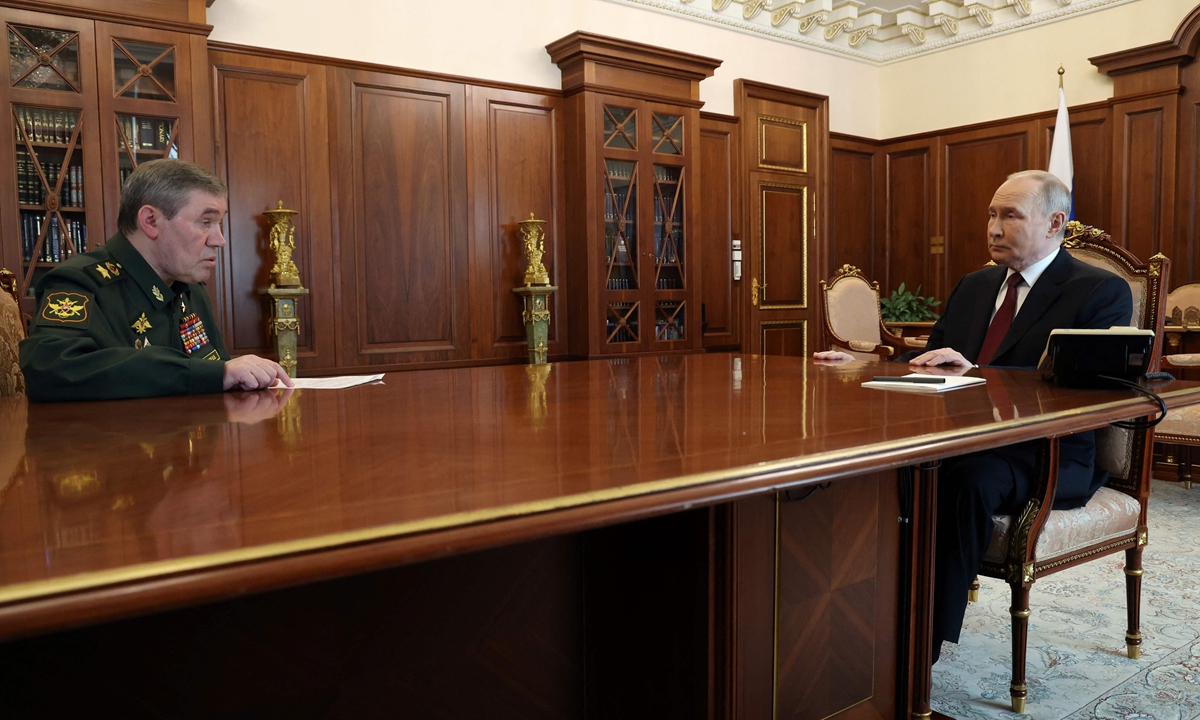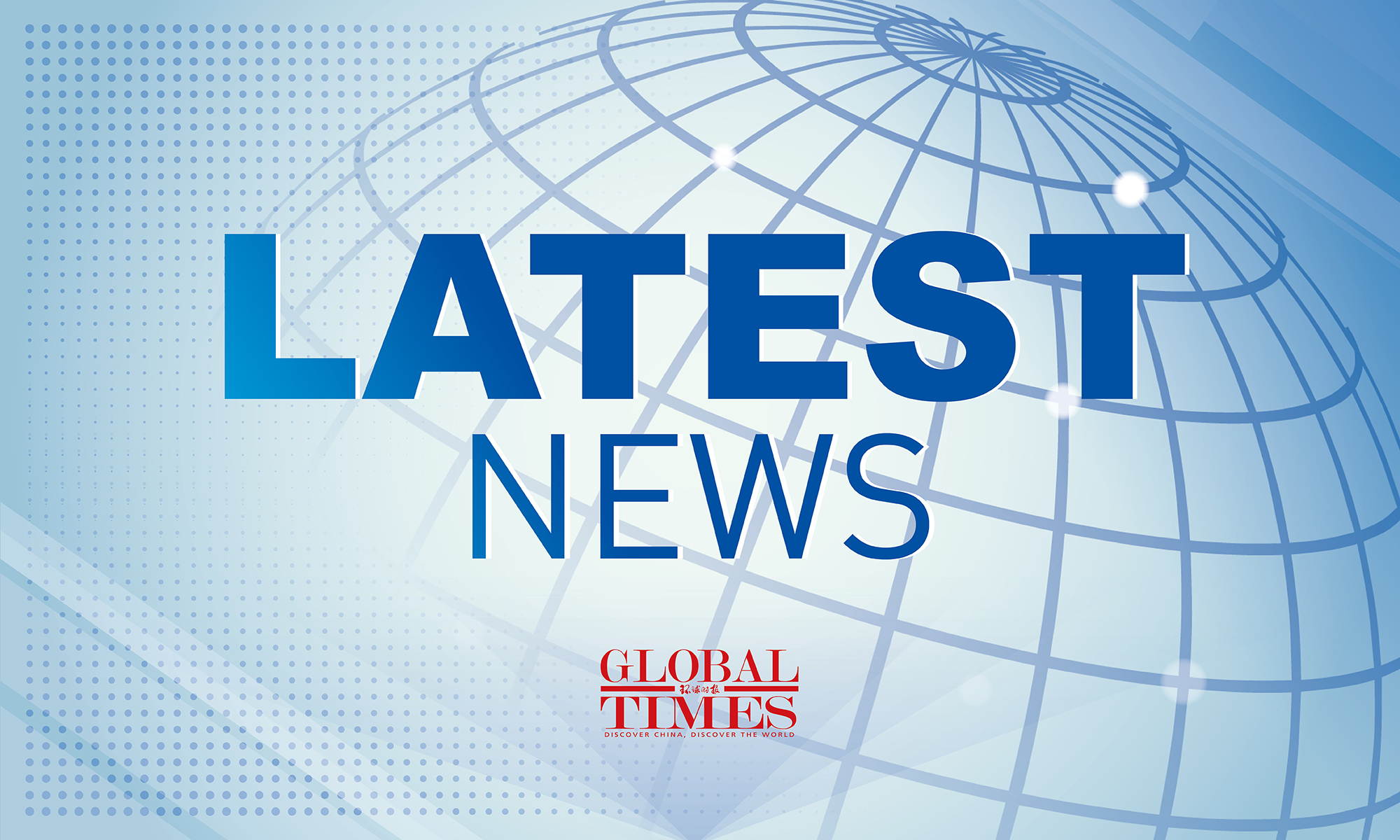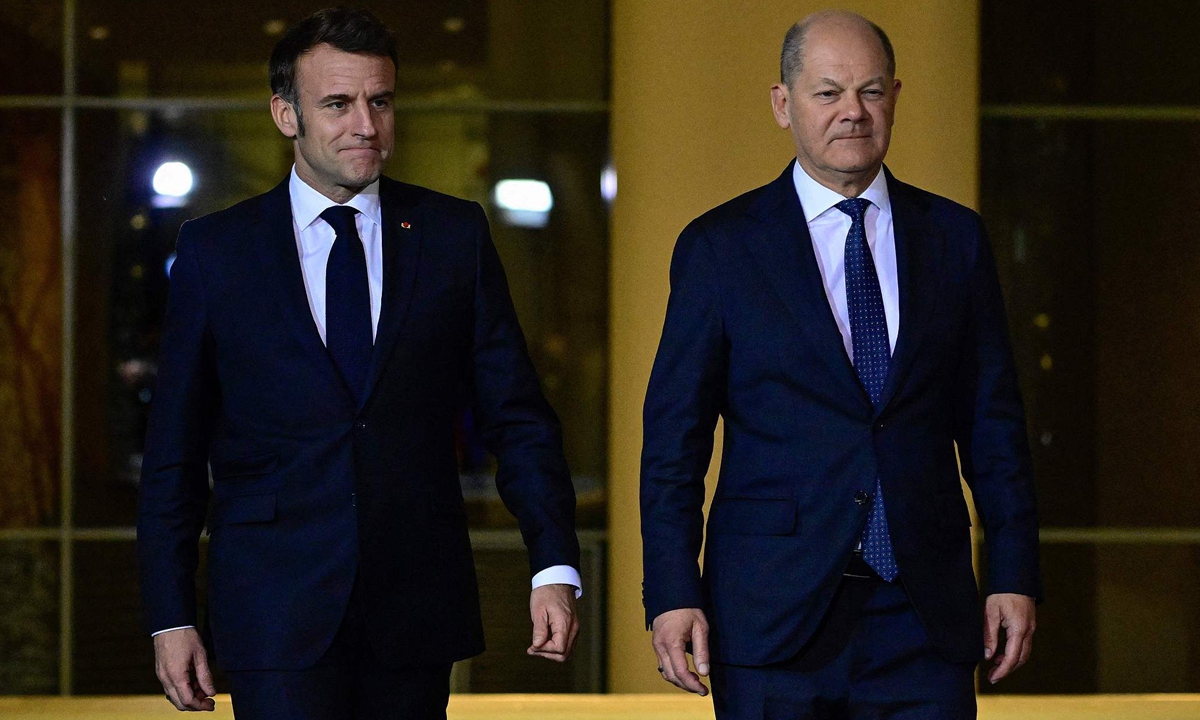
President Vladimir Putin meets with Chief of the General Staff of the Russian Armed Forces Valery Gerasimov in Moscow on April 19, 2025. Putin announced an Easter truce in the conflict in Ukraine starting this evening and lasting till midnight on April 20, 2025. Photo: VCG
Russian President Vladimir Putin has declared a brief Easter ceasefire, drawing global attention while sparking various interpretations. Chinese observers said on Sunday the declared ceasefire is more of a test or a window of opportunity to observe relevant parties' reactions, adding that whether it leads to deeper engagement depends on mutual sincerity.
During a meeting with chief of the General Staff Valery Gerasimov on Saturday, Putin announced that Russia would suspend all military operations during an Easter truce, which would be in effect from 18:00 Moscow time on April 19 to 00:00 Moscow time on April 21 - lasting 30 hours, according to TASS.
The TASS report also noted that "Moscow hopes Kiev will also observe the pause in hostilities. President Putin emphasized that Ukraine's response will reveal its genuine willingness and ability to engage in peace negotiations … Russian forces remain prepared to defend themselves and respond promptly should Ukraine violate the truce."
However, just hours after the declaration, Russia and Ukraine each accused the other of attacks.
Ukrainian officials accused Russian forces of continuing to fight. "According to the report of the commander-in-chief, Russian assault operations continue in some parts of the front line and Russian artillery continues to fire," Ukrainian President Volodymyr Zelensky said in an address on Saturday night.
TASS also reported on Sunday that the Ukrainian armed forces delivered a strike on Donetsk in the morning. The attack was registered near the Elevatornaya Street in the Budennovsky district of the city, TASS reported.
Zelensky countered the proposal by inviting Russia to extend the ceasefire beyond Easter Sunday. "This will show Russia's true intentions, because 30 hours is enough for headlines, but not for real confidence-building measures. Thirty days can give peace a chance," Zelensky wrote on Telegram on Saturday evening, according to The Kyiv Independent.
Putin's announcement of a 30-hour ceasefire could aim at creating space for continued dialogue with the US, Sun Xiuwen, an associate professor at the Institute for Central Asian Studies at Lanzhou University, told the Global Times on Sunday.
US President Donald Trump said Friday that the US could walk away from the negotiating table to end the Russia-Ukraine war. US Secretary of State Marco Rubio also said earlier Friday that the Trump administration "is nearing a point where it has to decide if both sides actually want a deal." Rubio said, "If it is, we're in. If it's not, then we have other priorities to focus on," Politico reported.
Sun also said that Easter, one of the most significant holidays in the Orthodox Church, offers a symbolic window for a ceasefire - projecting humanitarian concern and signaling a willingness for peace to the international community.
Wang Xiaoquan, an expert with the Institute of Russian, Eastern European and Central Asian Studies at the Chinese Academy of Social Sciences, said that on the battlefield, Russia's recent offensives have tapered off with significant consumption of ammunition and equipment. They need time to recuperate and address issues such as caring for the wounded. Meanwhile, Easter provides a fitting opportunity for Russia to give the US a gesture of goodwill while also allowing its troops to catch their breath, Wang told the Global Times.
Russia may see the ceasefire as a test to gauge Ukraine's willingness to negotiate, Wang said. If Kiev can't uphold a 30-hour Easter truce, Moscow may conclude that diplomacy is futile and further military pressure is needed.
A test for all
As of press time, there has been no clear response from the White House on the "Easter truce," although many American media outlets have covered the news.
An analysis released by CNN claimed that "it is possible this moment will prove a rare sign that both sides can stop violence for a short period. But it is significantly more likely they will both use violations and confusion to show their opponent cannot be trusted."
BBC noted that this is not the first time a pause in fighting has been suddenly announced - a previous attempt at a ceasefire during Orthodox Christmas in January 2023 fell apart after both sides failed to agree on a proposal.
The UN also took note of the temporary Easter. "We have consistently called for a durable ceasefire in Ukraine, and reiterate our support for meaningful efforts toward a just, lasting and comprehensive peace that fully upholds Ukraine's sovereignty, independence and territorial integrity, in line with the UN Charter, international law, and relevant UN resolutions," spokesperson Stephane Dujarric said in a statement, according to Anadolu Agency.
Analysts have said the ceasefire is more of a tactical gesture than a critical step toward lasting peace. The future of the conflict will depend on battlefield dynamics, strategic dialogue between Washington and Moscow, and Kiev's ability to maintain support from the West. The 30-day truce proposal could soon become a focal point in upcoming US-Russia and US-Ukraine talks.
Sun noted that the short truce is unlikely to yield substantial progress, as both sides remain entrenched in a "fight-and-negotiate" pattern.
Kiev's proposal to extend the ceasefire to 30 days is seen as a way to test Moscow's true intentions, the analyst said. Meanwhile, the EU has been sidelined by the US in the Russia-Ukraine negotiations, and the Ukraine crisis has become a catalyst for loosening the ties within the North Atlantic Alliance. Against this backdrop, the EU is regaining its strategic autonomy while supporting Ukraine's position, Sun said.
Relevant parties now view the 30-hour ceasefire as an opportunity to gauge each other's reactions. "It's a developing situation, and even Russia may delay any decision until it completes its assessment of battlefield conditions," said Wang.
"The temporary ceasefire is a window of opportunity. Whether it leads to deeper engagement or peace talks depends on mutual sincerity. Without it, the opportunity will be lost, and the conflict will likely continue until another chance arises," said the expert.
During a meeting with chief of the General Staff Valery Gerasimov on Saturday, Putin announced that Russia would suspend all military operations during an Easter truce, which would be in effect from 18:00 Moscow time on April 19 to 00:00 Moscow time on April 21 - lasting 30 hours, according to TASS.
The TASS report also noted that "Moscow hopes Kiev will also observe the pause in hostilities. President Putin emphasized that Ukraine's response will reveal its genuine willingness and ability to engage in peace negotiations … Russian forces remain prepared to defend themselves and respond promptly should Ukraine violate the truce."
However, just hours after the declaration, Russia and Ukraine each accused the other of attacks.
Ukrainian officials accused Russian forces of continuing to fight. "According to the report of the commander-in-chief, Russian assault operations continue in some parts of the front line and Russian artillery continues to fire," Ukrainian President Volodymyr Zelensky said in an address on Saturday night.
TASS also reported on Sunday that the Ukrainian armed forces delivered a strike on Donetsk in the morning. The attack was registered near the Elevatornaya Street in the Budennovsky district of the city, TASS reported.
Zelensky countered the proposal by inviting Russia to extend the ceasefire beyond Easter Sunday. "This will show Russia's true intentions, because 30 hours is enough for headlines, but not for real confidence-building measures. Thirty days can give peace a chance," Zelensky wrote on Telegram on Saturday evening, according to The Kyiv Independent.
Putin's announcement of a 30-hour ceasefire could aim at creating space for continued dialogue with the US, Sun Xiuwen, an associate professor at the Institute for Central Asian Studies at Lanzhou University, told the Global Times on Sunday.
US President Donald Trump said Friday that the US could walk away from the negotiating table to end the Russia-Ukraine war. US Secretary of State Marco Rubio also said earlier Friday that the Trump administration "is nearing a point where it has to decide if both sides actually want a deal." Rubio said, "If it is, we're in. If it's not, then we have other priorities to focus on," Politico reported.
Sun also said that Easter, one of the most significant holidays in the Orthodox Church, offers a symbolic window for a ceasefire - projecting humanitarian concern and signaling a willingness for peace to the international community.
Wang Xiaoquan, an expert with the Institute of Russian, Eastern European and Central Asian Studies at the Chinese Academy of Social Sciences, said that on the battlefield, Russia's recent offensives have tapered off with significant consumption of ammunition and equipment. They need time to recuperate and address issues such as caring for the wounded. Meanwhile, Easter provides a fitting opportunity for Russia to give the US a gesture of goodwill while also allowing its troops to catch their breath, Wang told the Global Times.
Russia may see the ceasefire as a test to gauge Ukraine's willingness to negotiate, Wang said. If Kiev can't uphold a 30-hour Easter truce, Moscow may conclude that diplomacy is futile and further military pressure is needed.
A test for all
As of press time, there has been no clear response from the White House on the "Easter truce," although many American media outlets have covered the news.
An analysis released by CNN claimed that "it is possible this moment will prove a rare sign that both sides can stop violence for a short period. But it is significantly more likely they will both use violations and confusion to show their opponent cannot be trusted."
BBC noted that this is not the first time a pause in fighting has been suddenly announced - a previous attempt at a ceasefire during Orthodox Christmas in January 2023 fell apart after both sides failed to agree on a proposal.
The UN also took note of the temporary Easter. "We have consistently called for a durable ceasefire in Ukraine, and reiterate our support for meaningful efforts toward a just, lasting and comprehensive peace that fully upholds Ukraine's sovereignty, independence and territorial integrity, in line with the UN Charter, international law, and relevant UN resolutions," spokesperson Stephane Dujarric said in a statement, according to Anadolu Agency.
Analysts have said the ceasefire is more of a tactical gesture than a critical step toward lasting peace. The future of the conflict will depend on battlefield dynamics, strategic dialogue between Washington and Moscow, and Kiev's ability to maintain support from the West. The 30-day truce proposal could soon become a focal point in upcoming US-Russia and US-Ukraine talks.
Sun noted that the short truce is unlikely to yield substantial progress, as both sides remain entrenched in a "fight-and-negotiate" pattern.
Kiev's proposal to extend the ceasefire to 30 days is seen as a way to test Moscow's true intentions, the analyst said. Meanwhile, the EU has been sidelined by the US in the Russia-Ukraine negotiations, and the Ukraine crisis has become a catalyst for loosening the ties within the North Atlantic Alliance. Against this backdrop, the EU is regaining its strategic autonomy while supporting Ukraine's position, Sun said.
Relevant parties now view the 30-hour ceasefire as an opportunity to gauge each other's reactions. "It's a developing situation, and even Russia may delay any decision until it completes its assessment of battlefield conditions," said Wang.
"The temporary ceasefire is a window of opportunity. Whether it leads to deeper engagement or peace talks depends on mutual sincerity. Without it, the opportunity will be lost, and the conflict will likely continue until another chance arises," said the expert.



